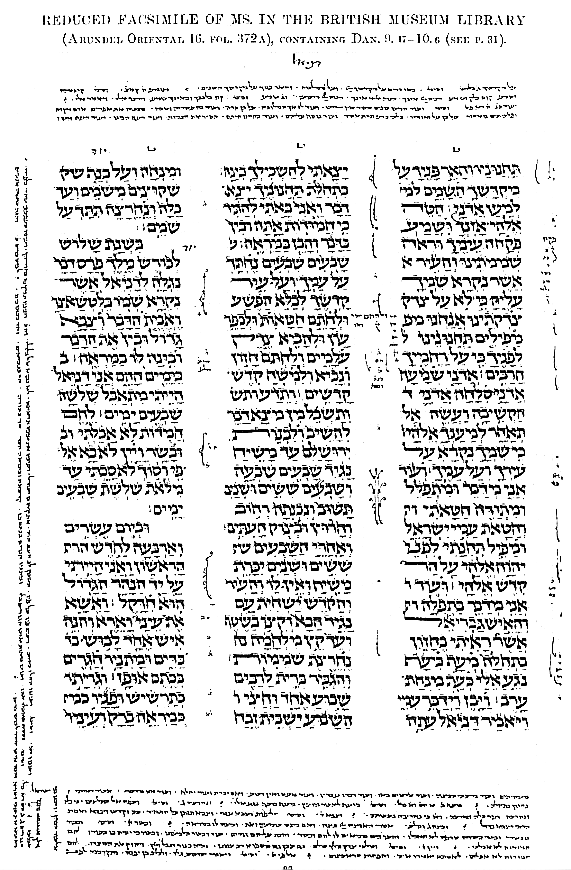Then you should have no problem giving adequate rebuttal to the following…
In Genesis 3 we have neither allegory, myth, legend, nor fable, but literal historical facts set forth, and emphasized by the use of certain Figures of speech (
see Ap. 6).
All the confusion of thought and conflicting exegesis have arisen from taking literally what is expressed by Figures, or from taking figuratively what is literal. A Figure of speech is never used except for the purpose of calling attention to, emphasizing, and intensifying, the reality of the literal sense, and the truth of the historical facts; so that, while the words employed may not be so strictly true to the letter, they are all the more true to the truth conveyed by them, and to the historical events connected with them.
But for the figurative language of verses 14 and 15 no one would have thought of referring the third chapter of Genesis to a snake : no more than he does when reading the third chapter from the end of Revelation (ch. 20:2). Indeed, the explanation added there, that the "old serpent" is the Devil and Satan, would immediately lead one to connect the word "old" with the earlier and former mention of the serpent in Gen. 3 : and the fact that it was Satan himself who tempted "the second man", "the last Adam", would force conclusion that no other than the personal Satan could have been the tempter of "the first man, Adam".
The Hebrew word rendered "serpent" in Gen. 3:1 is Nachash (from the root Nachash, to shine), and means a shining one. Hence, in Chaldee it means brass or copper, because of its shining. Hence also, the word Nehushtan, a piece of brass, in 2Kings 18:4. In the same way Saraph, in Isa. 6:2, 6, means a burning one, and, because the serpents mentioned in Num. 21 were burning, in the poison of their bite, they were called Saraphim, or Saraphs.
But with the LORD said unto Moses, "Make thee a fiery serpent" (Num. 21:8), He said, "Make thee a Saraph", and , in obeying this command, we read in v. 9, "Moses made a Nachash of brass". Nachash is thus used as being interchangeable with Saraph. Now, if Saraph is used of a serpent because its bite was burning, and is also used of a celestial or spirit-being (a burning one), why should not Nachash be used of a serpent because its appearance was shining, and be also used of a celestial or spirit-being (a shining one)?
Indeed, a reference to the structure of Gen. 3 (on p. 7) will show that the Cherubim (which are similar celestial or spirit-beings) of the last verse (Gen. 3:24) require a similar spirit-being to correspond with them in the first verse (for the structure of the whole chapter is a great Introversion). The Nachash, or serpent, who beguiled Eve (2Cor. 11:3) is not spoken of as "an angel of light" in v. 14. Have we not, in this, a clear intimation that it was not a snake, but a glorious shining being, apparently as angel, to whom Eve paid such great deference, acknowledging him as one who seemed to possess superior knowledge, and who was evidently a being of a superior (not of an inferior) order? Moreover, in the description of Satan as "the king of Tyre" (*1) it is distinctly implied that the latter being was of a supernatural order when he is called "a cherub" (Ezek. 28:14, 16, read from vv. 11-19). His presence "in Eden, the garden of 'Elohim" (v. 13), is also clearly stated, as well as his being "perfect in beauty" (v. 12), his being "perfect in his ways from the day he was created till iniquity was found in him" (v. 15), and as being "lifted up because of his beauty" (v. 17).
These all compel the belief that Satan was the shining one (Nachash) in Gen. 3, and especially because the followin 1000 g words could be addressed to him :-- "Thing heart was lifted up because of thy beauty, thou hast corrupted thy wisdom by reason of thy brightness : I will cast thee to the ground, I will lay thee before kings, that they may behold thee" (v. 17). Even supposing that these things were spoken to, and of, an exalted human being in later days (in Ezek. 28), still "the king of Tyre" is not compared to a being who was non-existent; and facts and circumstances which never happened are not introduced into the comparison.
There is more about "the king of Tyre" in Ezek. 28:11-19 than was literally true of "the prince of Tyre" (vv. 1-10). The words can be understood only of the mightiest and most exalted supernatural being that God ever created; and this for the purpose of showing how great would be his fall. The history must be true to make the prophecy of any weight.
Again, the word rendered "subtle" in Gen. 3:1 (see note) means wise, in a good sense as well as in a bad sense. In Ezek. 28:12 we have the good sense, "Thou sealest up the sum, full of wisdom"; and the bad sense in v. 17, "thou hast corrupted thy wisdom" (referring, of course, to his fall). So the word rendered "subtle" is rendered "prudent" in Prov. 1:4; 8:12; 12:23; 14:8; and in a bad sense in Job 15:5. 1Sam. 23:22. Ps. 83:3.
The word "beast" also, in Gen. 3:1, chay, denotes a living being, and it is as wrong to translate zoa "beasts" in Rev. 4, as it is to translate chay"beast" in Gen. 3. Both mean living creature. Satan is thus spoken of as being "more wise than any other living creature which Jehovah Elohim had made". Even if the word "beast" be retained, it does not say that either a serpent or Satan was a "beast", but only that he was "more wise" than any other living being. We cannot conceive Eve as holding converse with a snake, but we can understand her being fascinated (*2) by one, apparently "an angel of light" (i.e. a glorious angel), possessing superior and supernatural knowledge.



